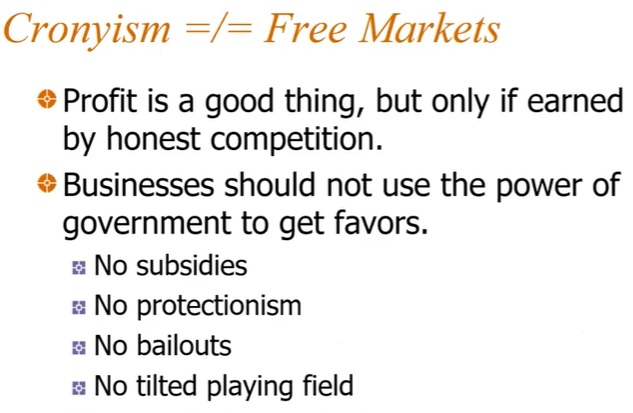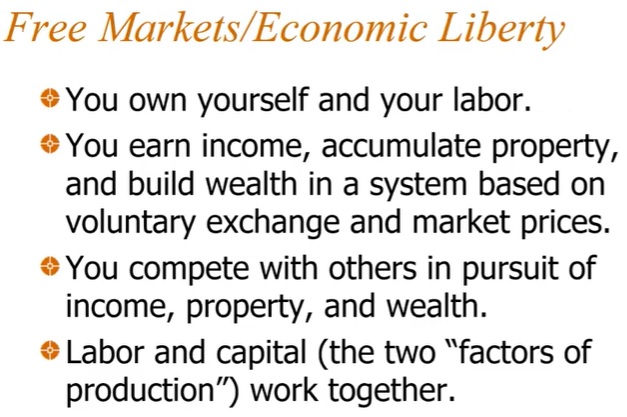I’ve made the case for capitalism (Part I, Part II, Part III, Part IV, and Part V) and the case against socialism (Part I, Part II, and Part III), while also noting that there’s a separate case to be made against redistribution and the welfare state.
This video hopefully ties together all that analysis.
If you don’t want to spend 10-plus minutes watching the video, I can sum everything up in just two sentences.
- Genuine socialism (government ownership, central planning, and price controls) is an utter failure and is almost nonexistent today (only in a few basket-case economies like Cuba and North Korea).
- The real threat to free enterprise and economic liberty is from redistributionism, the notion that politicians should play Santa Claus and give us a never-ending stream of cradle-to-grave goodies.
For purposes of today’s column, though, I want to focus on a small slice of the presentation (beginning about 2:00).
Here’s the slide from that portion of the video.
I make the all-important point that profits are laudable – but only if they are earned in the free market and not because of bailouts, subsidies, protectionism, or a tilted playing field.

This is hardly a recent revelation.
I first wrote about this topic back in 2009.
And many other supporters of genuine economic liberty have been making this point for much longer.
Or more recently. In a new article for City Journal, Luigi Zingales emphasizes that being pro-market does not mean being pro-business.
The first time I visited the Grand Canyon many years ago, I was struck…by a sign that said, “Please don’t feed the wild animals.” Underneath was an explanation: you shouldn’t feed them because it’s not good for them. …We should post something of this kind on Capitol Hill as well—with the difference being that the sign would read, “Please don’t feed the businesses.” That’s not because we don’t like business. Quite the opposite: we love business so much that we don’t want to create a situation where business is so dependent on…a system of subsidies, that it is unable to compete and succeed… This is the…difference between being pro-market and being pro-business. If you are pro-business, you like subsidies for businesses; you want to make sure that they make the largest profits possible. If, on the other hand, you are pro-markets, you want to behave like the ranger in the Grand Canyon: …ensuring that markets remain competitive and…preventing businesses from becoming too dependent on a crony system to survive.
Amen.
Cronyism is bad economic policy because government is tilting the playing field and luring people and businesses into making inefficient choices.
But I also despise cronyism because some people mistakenly think it is a feature of free enterprise (particularly the people who incorrectly assume that being pro-market is the same as being pro-business).
The moral of the story is that we should have separation of business and state.
P.S. There’s one other point from Prof. Zingales’ article that deserves attention.
He gives us a definition of capitalism (oops, I mean free enterprise).
We use the term “free markets” so often that we sometimes forget what it actually means. If you look up “free markets” in the dictionary, you might see “an economy operating by free competition,” or better, “an economic market or system in which prices are based on competition among private businesses and not controlled by a government.”
For what it’s worth, I did the same thing for my presentation (which was to the New Economic School in the country of Georgia).
Here’s what I came up with.

By the way, the last bullet point is what economists mean when they say things are “complementary.”
In other words, capital is more valuable when combined with labor and labor is more valuable when combined with capital – as illustrated by this old British cartoon (and it’s the role of entrepreneurs to figure out newer and better ways of combining those two factors of production).
One takeaway from this is that Marx was wrong. Capital doesn’t exploit labor. Capital enriches labor (just as labor enriches capital).
———
Image credit: Vinícius Pimenta | Pexels License.


